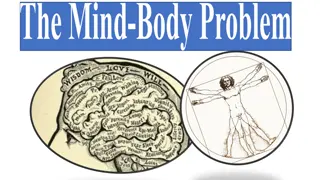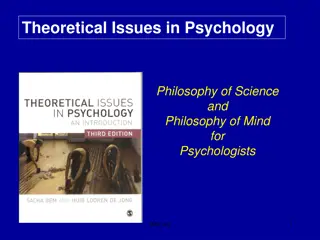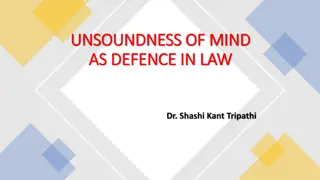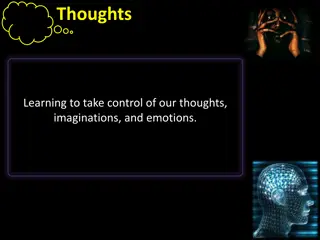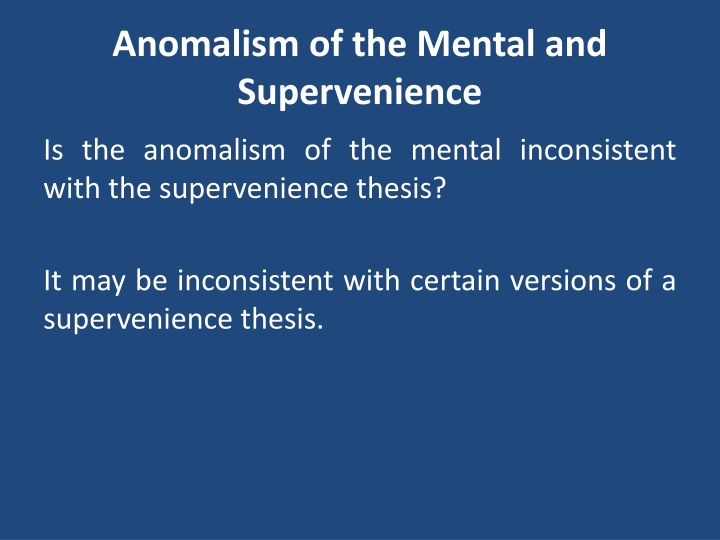
Anomalism and Supervenience in Philosophy of Mind
Explore the relationship between the anomalism of the mental and the supervenience thesis, considering Davidson's weak supervenience claim and the Epiphenomenalism Objection. Delve into the debate on whether mental properties play a causal role in physical effects and Davidson's response to this challenge.
Download Presentation

Please find below an Image/Link to download the presentation.
The content on the website is provided AS IS for your information and personal use only. It may not be sold, licensed, or shared on other websites without obtaining consent from the author. If you encounter any issues during the download, it is possible that the publisher has removed the file from their server.
You are allowed to download the files provided on this website for personal or commercial use, subject to the condition that they are used lawfully. All files are the property of their respective owners.
The content on the website is provided AS IS for your information and personal use only. It may not be sold, licensed, or shared on other websites without obtaining consent from the author.
E N D
Presentation Transcript
Anomalism of the Mental and Supervenience Is the anomalism of the mental inconsistent with the supervenience thesis? It may be inconsistent with certain versions of a supervenience thesis.
But note that Davidson holds a very weak supervenience claim: Predicate p supervenes on a set of predicates S if and only if p does not distinguish any entities that cannot be distinguished by S ( Thinking Causes ). That is, events that cannot be distinguished under some physical description cannot be distinguished under a mental description either.
The Epiphenomanlism Objection On Davidson s view, mental events are token- identical with physical events. This is supposed to preserve the idea that the mental causally interacts with the physical (premise 1 of his argument for physicalism). But do such events have their physical effects in virtue of their mental properties, or their physical properties?
The Epiphenomanlism Objection The fact that one can refer to event under some mental description doesn t mean that the mental properties of the event are playing a role in causing the physical effect. (Compare: The cause of the window smashing was my throwing of a brick. The latter event can be described as the throwing of something red. But it wasn t the redness of the brick that caused the window to break.)
The Epiphenomanlism Objection Don t the physical properties of the relevant events do all of the causal work? Leaving the mental properties of the events causally inert? So doesn t this view make the mental properties of events epiphenomenal?
Davidsons response: Properties don t cause anything, and so can be neither causally relevant or irrelevant. It is events that are the relata of the causal relation. That causal relation obtains between events no matter how they are described. It s a mistake to think that an event causes its effect in virtue of its possessing some properties and not others. However, some descriptions of the event that is the cause will offer a better causal explanation of the effect, than other descriptions.
Causation and Explanation: The claim that events are particulars that can be picked out and described in different ways is relevant to a distinction he draws between explanation and causation. Explanation is sensitive to how events are described, whereas causation is an extensional relation, obtaining between pairs of events independently of how they are described. Causes and effects can be accurately picked out using a variety of expressions, many of which are not explanatory.
Why are some descriptions of events that are causes better than others when it comes to explaining their effects? From a good explanation we expect a description of the event that can explain why the effect occurred given some true generalisation - a generalisation linking that kind of cause, so described, with the effect (under the relevant description).
Note that although Davidson denies that there are strict psycho-physical laws, he accepts that there are true generalisations linking the psychological and bodily events and behaviour. (Psychology is like other special sciences in this regard, and can invoke non-strict laws).
But if the laws of physics are strict, and the generalisations of psychology are not, won t it always be the case that physics offers the best explanation of any physical effect?
Davidson may say that physics can offer the best explanation of physical effects when those physical effects are characterised using the vocabulary of physics. But our intentional bodily actions are not ones we tend to characterise using the vocabulary of physics. So our bodily actions, described as such, may be best explained using the vocabulary of psychology.
Philosophy of Mind Functionalism
Defining Functionalism Functionalism is the theory that mental states and events are individuated by their causal roles. The functional role of a mental state is to be specified in terms of which states typically produce it, and which states and behaviour are typically produced by it.
On this view, what makes something a belief, desire, pain (or any other kind of mental state) depends not on its internal constitution, but solely the functional/causal role that it plays in the cognitive system of which it is part. In particular, its causal relations to sensory stimulations, other behaviour. mental states, and
It is thought that this theory improves on behaviourism as it recognizes that the mental cannot be simply reducible to the input and behavioural output. We need to posit the existence of a realm of inner conditions and events that causally mediate input and behavioural output if we are to adequately explain the complexity of our intentional behaviour.
Psychological behaviourism As a research program within psychology: As an empirical psychological theory, behaviourism holds that the behaviour of humans (and other animals) can be explained by appealing solely to behavioural dispositions i.e. to tendencies of organisms to behave in certain ways, given certain environmental stimulations. Psychological behaviourism purports to explain human and animal behaviour in terms of external physical stimuli, responses, learning histories, and (for certain types of behaviour) reinforcements. (Pavlov, Watson and Skinner).
Objections: In a review of Skinner's book on verbal behaviour, Chomsky argued that behaviourist models of language learning cannot explain various facts about language acquisition, such as the rapid acquisition of language by young children. Language as such seems to be learned without being explicitly taught in detail, and behaviourism doesn't offer an account of how this could be so.
Functionalism and Physicalism Functionalism physicalism, but it is consistent with it. It has been argued that functionalism completeness of physics physicalism. does not in itself entail and the together entail
Functionalism and Multiple Realizability Functionalism is often thought to be a way of accommodating the multiple realizability of the mental. Different physical states and events can instantiate mental states, as different physical states and events can occupy the causal role that individuates each mental state. So functionalism is sometimes thought to be a way of understanding what is wrong with type identity theories. Note, however, that Lewis is both a functionalist and type identity theorist.
Role-Functionalism and Realizer Functionalism What is the property of pain itself? Is it the higher-level relational property of being in some state or other that plays the pain role in the theory, or the physical/neural state that actually plays this role? Role-functionalists identify pain with the higher-level relational property. Realizer-functionalists take a functional theory to provide definite descriptions of whichever lower-level (e.g. neural) properties satisfy the functional characteriztions.
Motivations Functionalist theories have been motivated in a number of ways e.g consideration of the multiple realizability objection; a conceptual claim that our mental concepts are functional/causal concepts; as a critique of behaviourism; the success of cognitive psychology as an explanatory science; the computer model of the mind.
Varieties of Functionalism Analytic Functionalism: The goal is to provide analyses of our ordinary mental state concepts in functional terms.
Varieties of Functionalism Machine State Functionalism: The early functionalist theories of Putnam can be seen as a response to the difficulties facing behaviourism as a scientific theory, and as an endorsement of the (new) computational theories of mind which were becoming increasingly significant rivals to it. psychological
According to Putnam's machine state functionalism, any creature with a mind can be regarded as a Turing machine (an idealized finite state digital computer), whose operation can be fully specified by a set of instructions (a machine table or program) each having the form: If the machine is in state Si, and receives input Ij, it will go into state Skand produce output Ol(for a finite number of states, inputs and outputs).
An Analogy: Consider a machine that dispenses cans of Coke at 1 and takes 50p pieces and 1 coins. A functional analysis of the workings of this machine might look as follows:
50p 1 S1 don t deliver a Coke deliver a Coke Functional change to state S2 stay in state S1 Input State S2 deliver a Coke deliver a Coke and 50p change to state S1 change to state S1
(a) An analysis of this kind amounts to a theory, in the following sense: (i) it includes nomological (law-like) generalizations; (ii) it postulates unobservable entities, i.e. functional states of the kind S1 and S2; (iii) it provides causal explanations of observable behaviour by appeal to those unobservable entities.
(b) Within the theory, each functional state like S1 or S2 is fully definable in terms of its relation to inputs, outputs and other functional states. That is, nothing needs to be said about the precise nature of the machine s construction, the (physical) material it is made out of, etc.
(c) The explanation of the machines behaviour in terms of S1 and S2 depends on the existence of a (physical) mechanism implementing the functional structure. Thus, functional states are non-basic in this sense: A system is in a given functional state Sn in virtue of being in some (physical) state that occupies the causal role definitive of Sn.
Varieties of Functionalism Psycho-functionalism: Derives primarily from reflection upon the goals and methodology of cognitive psychological theories. The best empirical theories of behaviour take it to be the result of a complex of mental states and processes, introduced and individuated in terms of the roles they play in producing the behaviour to be explained. Mental states and processes are just those entities, with those properties, that are postulated by the best scientific explanation of behaviour.
The information used in the functional characterization of mental states and processes needn't be restricted to what is considered common knowledge or common sense, but can include information available only by careful laboratory observation and experimentation.
Questions: If we regard common-sense psychology as a theory, how does it relate to scientific psychology? Options: (i) The generalizations provided by common-sense psychology can be added to by further empirical study of people s behaviour in specific circumstances. (ii)What if there are situations in which scientific psychology seems to be in conflict with common sense. Does that mean that we have to revise our views on what mental states there are?
Varieties of Functionalism Long-arm functionalism: What is the best way to characterize the stimulations and behaviours that serve as inputs and outputs to a system? Should they be construed as events involving objects in a system's environment, or rather as events in that system's sensory and motor systems? Theories of the first type are often called long-arm functional theories (Block 1990), since they characterize inputs and outputs and consequently the states they are produced by and produce by reaching out into the world.
Functionalism and Mental Causation Some worry about whether role functionalism can account for what we take to be the causal efficacy of our mental states. For example, if pain is realized in me by some neural state- type, then insofar as there are purely physical law-like generalizations linking states of that type with pain behaviour, one can give a complete causal explanation of my behaviour by citing the occurrence of that neural state (and the properties by virtue of which it figures in those laws). And thus, some have argued, the higher-level role properties of that state its being a pain are causally irrelevant.
Are there different notions of causation in play? If so, how would this affect causal arguments for physicalism?
Functionalism and Norms of Reason Some argue that Davidson s interpretationist theory of the propositional attitudes is inconsistent with functionalism. Rationalization, unlike causal explanation, requires showing how an individual's beliefs, desires, and behaviour conform, or at least approximate, to certain a priori norms or ideals of theoretical and practical reasoning prescriptions about how we should reason, or what, given our beliefs and desires, we ought to do. Thus constitutive normative/rational relations among intentional states expressed by these principles cannot comprise a kind of explanation that has sources of evidence and standards for correctness that are different from those of a causal role/functional analysis of our mental states.
Functionalism and Qualia One of the threats facing functionalism is whether it can adequately account for the qualitative character of mental events. E.g. can it adequately account for the conscious aspects of experiences, sensations and other mental episodes?
Critics of functionalist accounts of the mental often appeal to thought experiments in which two subjects are in mental states that are functionally equivalent. If we can make sense of the idea that what it is like for one subject is different from what it is like for the other subject, then functionalism does not exhaust an account of the mental. (e.g. absent qualia and inverted spectrum arguments).
Inverted Spectrum Cases E.g. couldn t there be an individual satisfies the functional definition of our experience of red, but is experiencing green instead?
Absent Qualia Cases Couldn t equivalent to normal humans whose mental states have no qualitative character at all? there be creatures functionally
Do such thought experiments succeed in showing that qualia exist? What are qualia supposed to be, anyway? Does physicalism as well as functionalism? the existence of qualia threaten



![[PDF⚡READ❤ONLINE] Zen Mind, Beginner's Mind: 50th Anniversary Edition](/thumb/20459/pdf-read-online-zen-mind-beginner-s-mind-50th-anniversary-edition.jpg)


